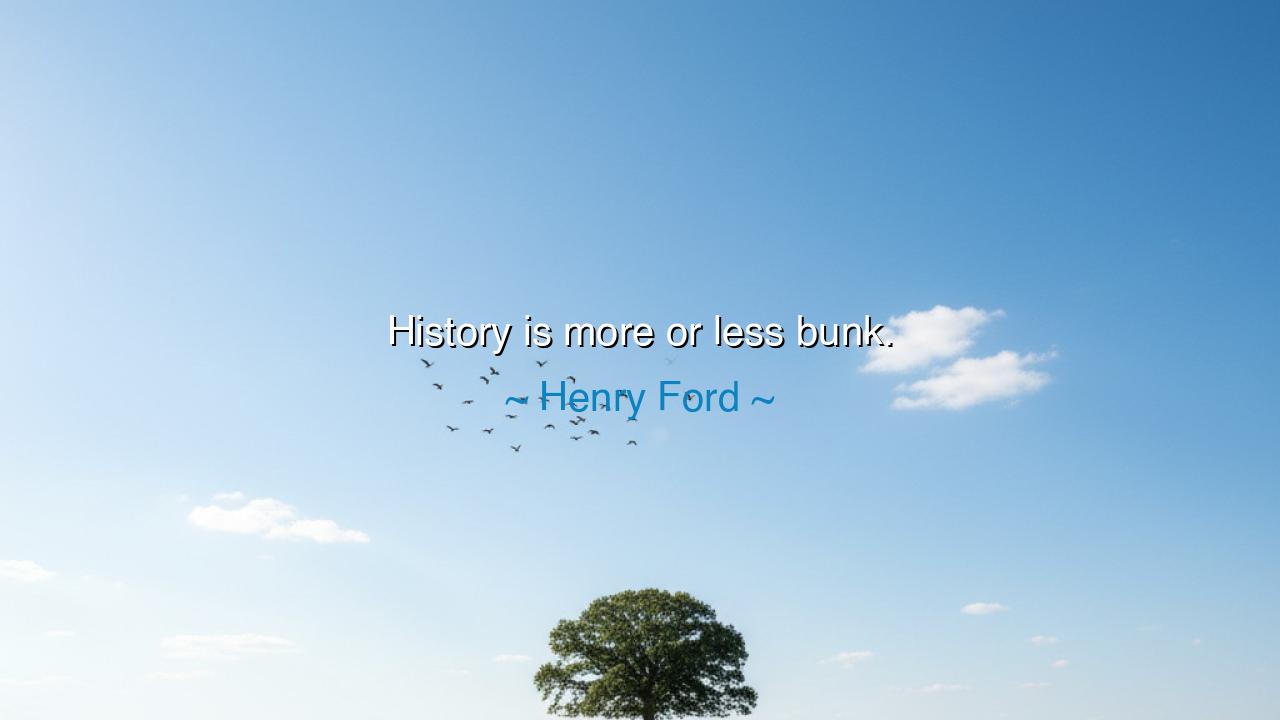
History is more or less bunk.






In the blunt and provocative words of Henry Ford, the industrial titan who transformed the modern world, there echoes a challenge that has stirred debate for more than a century: “History is more or less bunk.” These words, first spoken in 1916, seem at first to carry the arrogance of a man too busy forging the future to care for the past. Yet beneath their apparent dismissal lies a restless truth—a call to action, a rejection of complacency, and a belief that progress cannot be chained to memory. Ford’s words are not a condemnation of knowledge itself, but of humanity’s tendency to idolize history instead of learning from it. He was not scorning wisdom, but the worship of dust.
The origin of this quote lies in Ford’s interview with the Chicago Tribune, where he was accused of being ignorant of history. The reporter, seeking to expose him as an uneducated mechanic, asked about great men of the past. Ford, who built his empire not from books but from bolts and belief, replied with impatience: “History is more or less bunk. It’s tradition. We don’t want tradition. We want to live in the present, and the only history that is worth a tinker's dam is the history we make today.” His words were not the ignorance of an unlearned man, but the creed of a visionary who believed that greatness is achieved not by remembering what was, but by creating what will be.
To call history “bunk” is to challenge the comfort of nostalgia—the temptation to dwell in past glories instead of building new ones. Ford saw that too many men lived in the shadow of old heroes, reciting their stories while failing to act with the same courage. He believed that reverence for the past often paralyzes the present. The ancients themselves warned against this: for while tradition carries wisdom, it can also become a chain that binds the spirit of progress. Ford’s message was thus a rebellion against stagnation—an insistence that every age must forge its own meaning. The machines he built were symbols of this philosophy: each new model surpassed the old, each invention rendered its predecessor obsolete. The world, he believed, must move ever forward, unafraid to discard even its own achievements in the pursuit of something better.
Yet Ford’s words also carry a deeper, more unsettling truth. History is not merely a record—it is interpretation. The stories we inherit are shaped by victors and visionaries, by memory and myth. Ford, who rose from obscurity to shape the modern era, understood that the past is never neutral—it can be manipulated to justify the present. By calling history “bunk,” he was warning against blind trust in what others claim to be truth. He saw how men hid behind the authority of history to resist change, to defend privilege, to say, “It has always been this way.” His defiance was a declaration that progress must never bow to precedent.
Consider the tale of the Wright brothers, who, like Ford, defied the wisdom of their age. For centuries, scholars declared that human flight was impossible. The weight of “history” was against them—no one had ever succeeded, therefore none could. Yet in 1903, upon the sands of Kitty Hawk, they shattered that false history. They did not accept the record of failure as fate; they rewrote it. This is what Ford meant: that history, when accepted uncritically, becomes a graveyard of possibility. To live boldly, one must dare to disbelieve it.
Still, it would be foolish to read Ford’s words as a call to ignorance. The wise do not destroy history; they liberate themselves from its tyranny. The true student of the past does not bow before it but learns from its flaws. The same Ford who dismissed history also built upon its lessons—the discipline of the craftsman, the vision of the engineer, the courage of the entrepreneur. His genius lay not in rejecting knowledge, but in transforming it into action. The past was valuable to him only insofar as it illuminated the path forward. To dwell in history without innovation, he believed, was to live among ghosts.
So, my children, let us understand the wisdom beneath his boldness. Do not let history rule you; let it teach you. Study the past, but do not worship it. Honor the heroes who came before, but do not let their greatness silence your own. The world does not move by looking backward—it moves by those who dare to take the next step. Let your life be the history future generations remember not as imitation, but as inspiration. Build new paths where old ones end, and remember: every discovery, every reform, every revolution begins with someone who dared to say, the past is not enough.
For in the end, Henry Ford’s words are not a rejection of history—they are a summons to creation. The past, he reminds us, is but prologue; the true story of humanity is written each day by those with courage to act. And so, as the ancients taught and Ford echoed in modern form: the duty of man is not to preserve the ashes, but to pass on the fire.






AAdministratorAdministrator
Welcome, honored guests. Please leave a comment, we will respond soon